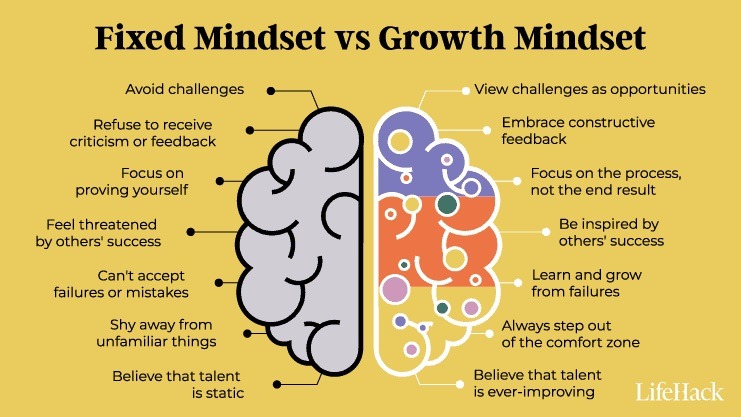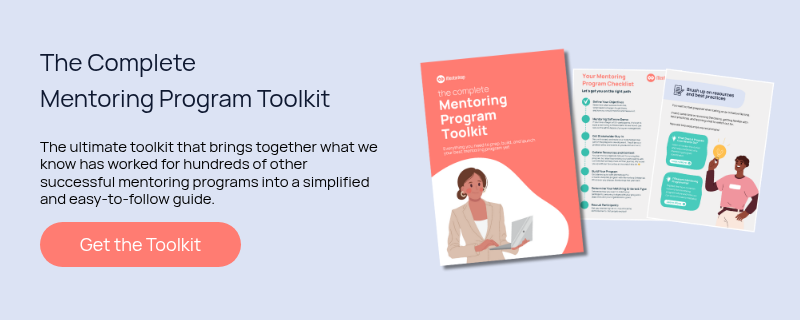We all have different beliefs about our abilities, and these beliefs shape how we approach challenges and failures.
Some people have a growth mindset, which means they hold an internal belief that their talents and intelligence can be developed through hard work, dedication, and a willingness to learn from mistakes.
Others have a fixed mindset, which means they believe that their abilities are innate and cannot be changed much, if at all.
In this article, we will explore the differences between these mindsets and what they really mean for personal growth and success.

Research has shown that having a growth mindset can lead to better academic performance. Students who believe that their intelligence and abilities can be developed through hard work and dedication are more likely to put in the effort and persist through difficult tasks.
But it’s not just in academics where a growth mindset can be beneficial. In the workplace, those with a growth mindset are more likely to take on new challenges and learn new skills, leading to career advancement and personal growth. They are also more likely to collaborate with others and seek out feedback, which can lead to improved performance and better relationships with colleagues.
Beyond personal benefits, a growth mindset can also have a positive impact on society as a whole. When individuals believe that their abilities can be developed through hard work and dedication, they are more likely to take on challenges and work towards making a difference in their communities. They are also more likely to embrace diversity and seek out new perspectives, leading to more inclusive and innovative solutions to societal issues.
It’s important to note that developing a growth mindset is not always easy, and it requires intentional effort and practice. However, by embracing challenges, seeking out feedback, and persevering through obstacles, individuals can cultivate a growth mindset and reap the many benefits that come with it.
Debunking Common Myths About Fixed Mindsets
Fixed mindsets are often misunderstood.
Myth 1: You are either born with talent or you are not
One of the most common myths is that you are either born with talent or you are not and that no amount of hard work can change that. This is simply not true. While some individuals may have natural abilities in certain areas, everyone has the potential to improve with practice and effort. Deliberate practice can lead to significant improvements in performance, regardless of initial talent levels.
Myth 2: Failure is a reflection of one’s intelligence or ability
Another common myth is that failure is a reflection of one’s intelligence or ability. When in reality, failure is just a natural, and unavoidable, part of the learning process. Those who embrace failure as an opportunity to learn and grow are more likely to succeed in the long run. When we fail, we are forced to reflect on our mistakes and think of new ways to approach the problem. This helps us to develop new skills and strategies that we can apply in future situations.
What’s challenging for many, is that having a fixed mindset can lead to a crippling fear of failure.
When we believe that our abilities are fixed, we’re more likely to avoid taking risks or trying new things because we are afraid of failing. This limits our potential for growth and development. Whereas those with a growth mindset are more likely to take risks and try new things, even if they may fail. This allows them to learn from their mistakes and continue to improve.
Myth 3: Those with a fixed mindset are simply not motivated to learn or improve
Individuals with a fixed mindset may be motivated to learn and improve, but they may also believe that their abilities are limited. As a result, paradoxically, they may not put in the effort required to achieve their goals. By adopting a growth mindset and believing that their abilities can be developed, they may be more motivated to put in the necessary effort to achieve their goals.
Understanding the Fundamentals of a Growth Mindset vs Fixed Mindset
The mindset you adopt can have a significant impact on your life.
People with a growth mindset believe that their abilities can be developed and improved over time, while those with a fixed mindset believe that their abilities are innate and cannot be changed.
Research has shown that individuals with a growth mindset tend to be more resilient, persistent, and motivated. They embrace challenges and view them as opportunities to learn and grow, rather than as threats to their self-worth. Those with a fixed mindset, on the other hand, may actually be more likely to give up when faced with challenges, as they believe that their abilities are fixed and cannot be improved.
It’s important to note that having a growth mindset doesn’t mean that you will never experience failure. Instead, it means that you will view failure as a natural part of the learning process and use it as an opportunity to develop new skills and strategies.
☝️ People with a growth mindset are more likely to seek out feedback and use it to improve their performance, while those with a fixed mindset may be more likely to ignore feedback or become defensive when receiving it.
A growth mindset vs fixed mindset often also impacts the way in which individuals approach their goals.
People with a growth mindset tend to set goals that are focused on learning and development, while those with a fixed mindset may set goals that are more focused on proving their abilities or achieving a specific outcome.
Understanding the differences between growth and fixed mindsets can help you to adopt a more positive and productive approach to learning and personal development. By embracing challenges, seeking out feedback, and focusing on the process of growth and learning, you can develop a growth mindset that will help you to achieve your goals and reach your full potential.
The Science Behind the Development of a Growth Mindset
Our beliefs about intelligence and talent can have a significant impact on our motivation and performance.
| Growth Mindset | Fixed Mindset |
| Those who have a growth mindset believe that their abilities can be developed through hard work and dedication, which can lead to increased motivation and a willingness to take on new challenges. | Those with a fixed mindset tend to view their abilities as being set in stone, which can lead to a fear of failure or a reluctance to take on challenges |
One of the key factors that contribute to the development of a growth mindset is the concept of neuroplasticity. This refers to the brain’s ability to change and adapt in response to new experiences and challenges. When we engage in activities that challenge us, such as learning a new skill or tackling a difficult problem, our brain forms new neural connections and strengthens existing ones. Over time, this can lead to significant improvements in our cognitive abilities and overall performance.
The role of effort and persistence is another important factor in the development of a growth mindset. Those with a growth mindset understand that success is not just about innate talent, but also about putting in the time and effort to develop their skills. They are willing to work hard, even in the face of setbacks and challenges, and believe that their efforts will ultimately pay off.
Interestingly, the language we use to praise and encourage others can have an impact on their mindset.
Those who receive praise for their effort and hard work, rather than just their innate abilities, are more likely to develop a growth mindset. This is because they come to see themselves as capable of improving through their own efforts, rather than just relying on their natural talents.
In fact, this is one way to instil self-esteem in children that can be long-lasting and lifelong.
By understanding that our abilities can be developed through hard work and dedication, we are more likely to take on new challenges and persist in the face of setbacks. Through the concept of neuroplasticity, we can continue to improve and grow throughout our lives, and ultimately achieve our goals and aspirations.
How to Cultivate a Growth Mindset in Yourself
If you currently have a fixed mindset, it is possible to shift towards a growth mindset with some effort and practice. One way to do this is to embrace challenges and view them as opportunities for growth and learning. Another strategy is to learn from failure by reflecting on what went wrong and how you can improve your approach in the future. It is also important to seek out feedback and to be open to learning from others, as this can help you develop new skills and improve your performance.
Comparing the Pros and Cons of a Growth Mindset vs Fixed Mindset
There are advantages and disadvantages to both growth and fixed mindsets. Those with a growth mindset tend to be more resilient and willing to take on challenges, but they may also be more prone to overestimating their abilities and taking on too much at once. Those with a fixed mindset may feel more secure in their abilities, but they may also be more likely to hold themselves back from new experiences and opportunities. Ultimately, the key is to find a balance between the two mindsets, embracing growth and learning while also acknowledging one’s natural talents and abilities.

Addressing the Challenges of Adopting a Growth Mindset
Adopting a growth mindset can be challenging, particularly for those who have spent much of their lives with a fixed mindset. It may require a shift in perspective and a willingness to embrace discomfort and uncertainty. It may also require a willingness to take on challenges and push oneself out of one’s comfort zone. However, with practice and dedication, it is possible to develop a growth mindset and reap the benefits of this approach to personal growth and success.
Uncovering the Benefits of a Fixed Mindset
While a growth mindset is generally seen as more advantageous, there are also some benefits to having a fixed mindset. For example, those with a fixed mindset may be more comfortable with routine and may be less prone to taking unnecessary risks. They may also have a greater sense of security in their abilities, which can lead to greater confidence and less self-doubt. However, it is important to recognize the limitations of a fixed mindset and to be willing to embrace growth and change when necessary.
Growth Mindset: A Key to Success
Having a growth mindset is essential for personal and professional development. It is the belief that one’s abilities and intelligence can be developed through dedication and hard work. This mindset is crucial for achieving success in various aspects of life.
Embracing Challenges
Individuals with a growth mindset see challenges as opportunities for growth. For example, a student with a growth mindset who receives a low grade on a test will view it as a chance to learn from their mistakes and improve their study habits. They aren’t afraid to take on new tasks and push themselves out of their comfort zone. Instead of being discouraged by setbacks, they view them as learning experiences and opportunities to improve.
By embracing challenges, individuals with a growth mindset are able to develop resilience and perseverance, which are essential qualities for success in any endeavor.
Continuous Learning
One of the key characteristics of a growth mindset is the desire for continuous learning. For instance, an employee with a growth mindset is always seeking to expand their knowledge and skills. They are open to feedback and see it as a way to improve and grow.
By constantly seeking to learn and improve, individuals with a growth mindset are able to adapt to new situations and stay ahead in a rapidly changing world.
Leveraging a Growth Mindset to Reach Your Goals
Whether you currently have a growth mindset or are working to develop one, there are several strategies you can use to leverage this approach to personal growth and success. One key strategy is to set challenging goals for oneself and to view them as opportunities for growth and learning. It is also important to seek out feedback and to be open to learning from others, as this can help you develop new skills and improve your performance.
Ultimately, a growth mindset can be a powerful tool for achieving one’s goals and realizing one’s full potential.
Running a mentoring program is an invaluable strategy for instilling a growth mindset within your team or organization. This powerful approach pairs individuals eager to learn with experienced mentors who champion the philosophy of continuous development.
Witnessing mentors’ journeys, your team members will come to appreciate the importance of resilience, effort, and persistence in reaching their goals. Mistakes and setbacks will be redefined as stepping stones to progress. Mentoring programs assist in creating a culture of ongoing learning, encouraging individuals to embrace challenges, take calculated risks, and adapt to change. By investing in a mentoring program, you’re not just nurturing individuals; you’re cultivating a collective mindset that will drive both personal and organizational success.
And we’ve made it very easy – you can get started by building your mentoring program in just four easy steps.






